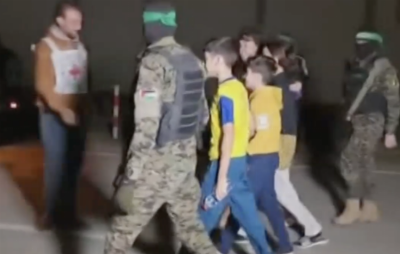Share
Human Rights Voices
While the UN devotes its human rights operations to the demonization of the democratic state of Israel above all others and condemns the United States more often than the vast majority of non-democracies around the world, the voices of real victims around the world must be heard.
Palestinian Authority/Gaza, December 5, 2023
Hamas Drugged Freed Hostages to Make Them ‘Look Happy’
Original source
Hamas drugged hostages seized from Israel during the terror group’s Oct. 7 massacre as they were being released “so that they would look happy” to the outside world, according to Israel’s Health Ministry.
Dr. Hagar Mizrahi, head of the ministry’s general medicine division, told Israeli lawmakers on Tuesday that Hamas terrorists gave tranquilizer pills to the captives who were set to be freed from captivity in Gaza as part of a temporary ceasefire deal in order to make them appear calm and happy.
Speaking to the Health Committee of Israel’s parliament, known as the Knesset, Mizrahi specifically named the drug Clonazepam. The drug — known as Clonex in Israel and sold under the brand names Klonopin and Rivotril elsewhere — is used to prevent and treat various mental health issues, including bipolar mania and anxiety disorders.
Mizrahi did not disclose whether the drugging had been confirmed by the testimony of freed hostages, blood tests done on the released hostages at Israeli hospitals, or both.
Israel has decried clips of Israeli hostages waving goodbye to Hamas terrorists during their release as propaganda, urging the public not to buy the forced act. Hamas-affiliated media even released a letter supposedly written by Danielle Aloni, an Israeli mom freed from captivity, praising the terrorists for their “extraordinary humanity” towards her 5-year-old daughter, Emilia. Relatives warned the public not to believe the letter, similarly dismissing it as propaganda.
Mizrahi’s testimony came amid a flurry of recent reports highlighting the trauma and torture — both physical and psychological — that the hostages endured.
Last week, for example, the aunt of a 12-year-old boy who was released from captivity in Gaza revealed disturbing details of threats and psychological abuse inflicted on her nephew by Hamas terrorists. Beyond physical abuse, child hostages were forced to watch the Oct. 7 massacre — in which Hamas-led terrorists murdered over 1,200 people across southern Israel and took more than 240 hostages — on film in silence, and any cries they made resulted in threats at gunpoint.
Dozens of the hostages, who included the elderly and young children, were recently released as part of a temporary week-long ceasefire and hostage-prisoner swap deal between Israel and Hamas. The arrangement ended on Friday when both sides could not reach an agreement to extend the truce.
Israeli health authorities have examined the freed hostages and found they suffered severe weight loss during their captivity in Gaza, the Palestinian enclave ruled by Hamas.
On Tuesday, Mizrahi highlighted the cruel treatment that the hostages suffered at the hands of the terror group.
“In the hospitals, forensic doctors documented the war crimes left on the returnees” Mizrahi told Israeli lawmakers. “Some of the crimes are starvation, lack of medical treatment, and prolonged shackles.”
The Health Ministry representative added: “War crimes were also documented, the main of which was the lack of adequate medical treatment. There was certainly evidence of this. There were cases of poor feeding that I ask not to expand on — not only because of the secrecy but also because of the meaning it has on the people who are there.”
Israeli hospitals have been working to document the medical condition of released hostages to paint a clearer picture of the atrocities inflicted on them — and what those still in captivity may be enduring.
Relatives of those still being held hostage have pleaded with the Israeli government to do more to bring their loved ones home.
Yarden Gonen, whose sister Romi is among those still captive, described the pain of the situation. “I think about it every day that she is there,” Gonen said. “She lives knowing that her soulmate is being murdered in front of her eyes. Someone lost their soulmate in front of their eyes? How do we leave them there? I have no words to emphasize how much we cannot contain it anymore.”
There are still well over 100 hostages being held by Hamas and other Palestinian terrorists in Gaza, many of whom are the fathers, brothers, and relatives of those already released. Only women and children were freed under the terms of the ceasefire agreement.
While most reports have focused on the hostages’ physical health, it is unclear how captivity will impact their mental health after experiencing such trauma.
Thomas Hand, the father of nine-year-old Emily Hand who was released by Hamas during the ceasefire, revealed last week that his daughter initially cried herself to sleep and spoke in a whisper because she was conditioned in captivity not to make any noise.

